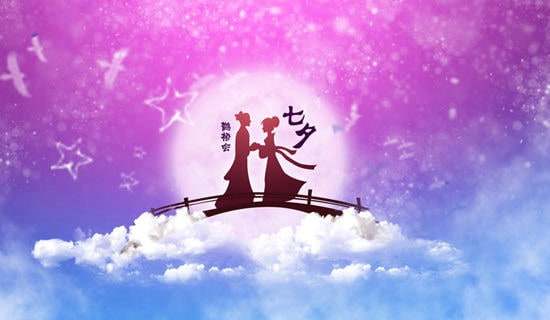七夕节的来历英语
七夕节的来历英语

七夕节的来历英语
The Double Seventh Festival, on the 7th day of the 7th lunar month, is a traditional festival full of romance. It often goes into August in the Gregorian calendar
This festival is in mid-summer when the weather is warm and the grass and trees reveal their luxurious greens. At night when the sky is dotted with stars, and people can see the Milky Way spanning from the north to the south. On each bank of it is a bright star, which see each other from afar. They are the Cowherd and Weaver Maid, and about them there is a beautiful love story passed down from generation to generation.
Long, long ago, there was an honest and kind-hearted fellow named Niu Lang (Cowhand). His parents died when he was a child. Later he was driven out of his home by his sister-in-law. So he lived by himself herding cattle and farming. One day, a fairy from heaven Zhi Nu (Weaver Maid) fell in love with him and came down secretly to earth and married him. The cowhand farmed in the field and the Weaver Maid wove at home. They lived a happy life and gave birth to a boy and a girl. Unfortunately, the God of Heaven soon found out the fact and ordered the Queen Mother of the Western Heavens to bring the Weaver Maid back.
With the help of celestial cattle, the Cowhand flew to heaven with his son and daughter. At the time when he was about to catch up with his wife, the Queen Mother took off one of her gold hairpins and made a stroke. One billowy river appeared in front of the Cowhand. The Cowhand and Weaver Maid were separated on the two banks forever and could only feel their tears. Their loyalty to love touched magpies, so tens of thousands of magpies came to build a bridge for the Cowhand and Weaver Maid to meet each other. The Queen Mother was eventually moved and allowed them to meet each year on the 7th of the 7th lunar month. Hence their meeting date has been called "Qi Xi" (Double Seventh).
Scholars have shown the Double Seventh Festival originated from the Han Dynasty (206 BC-AD220). Historical documents from the Eastern Jin Dynasty (AD371-420) mention the festival, while records from the Tang Dynasty (618-907) depict the grand evening banquet of Emperor Taizong and his concubines. By the Song (960-1279) and Yuan (1279-1368) dynasties, special articles for the "Qi Xi" were seen being sold on markets in the capital. The bustling markets demonstrated the significance of the festival.
Today some traditional customs are still observed in rural areas of China, but have been weakened or diluted in urban cities. However, the legend of the Cowhand and Weaver Maid has taken root in the hearts of the people. In recent years, in particular, urban youths have celebrated it as Valentine's Day in China. As a result, owners of flower shops, bars and stores are full of joy as they sell more commodities for love.
【中文译文】
七夕节的由来
在我国,农历七月初七,人们俗称“七夕节”,也有人称之为“乞巧节”或“女儿节”,这是中国传统节日中最具浪漫色彩的一个节日,也是过去姑娘们最为重视的日子。其实不仅仅是汉族,壮族、满族、朝鲜族等也有过“七夕节”的习俗。
不过,随着西方“情人节”流入中土,“七夕节”逐渐又被人称为中国的“情人节”。然而她在年轻人中的影响力,却远不及每年阳历2月14日的西方“情人节”。不光如此,象这样历史悠久且文化内涵深厚、有如此美丽传说的.节日,竟越来越不受社会重视,越来越受冷落,是世界变化得太快?还是节日不够现代跟不上时代?牛郎织女难道真的会被中国人遗弃吗?“七夕节”受冷落迫使我们的目光又聚焦到中国传统节日的兴衰上。农历七月初七——七夕节
很久以前,有一个跟着哥嫂过活的孤儿,既聪明又勤快,可嫂嫂仍嫌弃他,天不亮就赶他上山放牛,大家都叫他牛郎。几年后,哥嫂和牛郎分了家,狼心的嫂嫂只给他一间破茅房、一头老牛。从此,牛郎白天放牛、砍柴,晚上就和老牛同睡在那间破茅房内。
一天,牛郎赶牛走进了一片陌生的树林,这里山青水秀、鸟语花香。牛郎见到九个仙女驾着祥云落在河的草地上,然后脱去五彩霓裳,跳进清澈见底的河水里,牛郎盯着一个最年轻是美丽的仙女看入了神,这时老牛突然说话了:“她是天上的织女,只要拿走五彩霓裳,她就会做你的妻子。”牛郎悄悄地沿着树从,悄悄拿走了织女的五彩霓裳。
天近午时,其他仙女纷纷穿起五彩霓裳,驾着祥云而去。唯独找不到五彩霓裳的织女留下了。这时,牛郎从树后走出,请求织女做他的妻子。织女见牛郎忠厚老实,勤劳健壮,便脉脉含羞地点了点头。 牛郎织女喜结良缘后,男耕女织,互敬互爱。
两年后,织女生下一男一女。然而天帝闻知织女下嫁人间,勃然大怒。七月初七,王母奉旨带着天兵天将捉了织女。悲痛欲绝的牛郎在老牛的帮助下,用萝筐挑着儿女追上天去。眼看追上了,王母拔下金簪一划,牛郎脚下立刻出现一条波涛汹涌的天河。 肝肠寸断的织女和肩挑儿女的牛郎,一个在河东一个在河西,遥望对泣。哭声感动了喜鹊,霎时无数的喜鹊飞向天河,搭起一座鹊桥,牛郎织女终于可以在鹊桥上相会了。
【七夕节的来历英语】相关文章:
除夕的来历07-06
春节对联的来历10-28
端午节的来历06-22
祭灶节的节日来历07-11
清朝八旗的来历07-27
对联的来历十字10-04
清明节的来历作文素材03-17
新年来历的手抄报12-05
优秀议论文:对联的来历09-26
中秋节吃月饼的来历介绍07-10